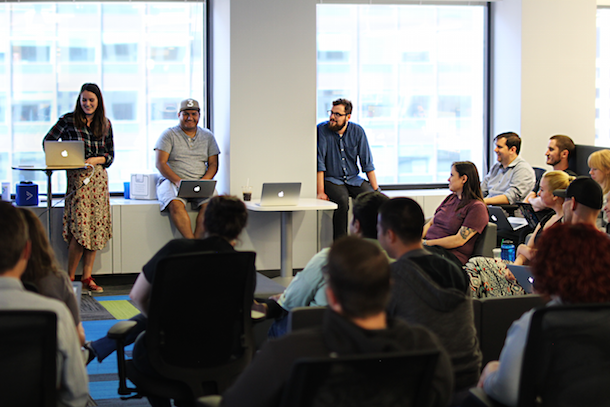
Four years ago, Jason VandeBoom had a difficult decision to make.
His marketing technology company, ActiveCampaign, had been growing steadily and profitably for the past decade selling perpetual software licenses, but the industry was rapidly pivoting toward subscription-based services. VandeBoom knew that transitioning to SaaS was the right move for his business in the long term, but he also knew that the pivot would mean turning his back on steady revenue.
He did it anyway, and turned ActiveCampaign into one of Chicago’s fastest-growing companies in the process. After starting 2017 with 80 employees, ActiveCampaign passed 130 employees in May — and VandeBoom expects to reach 200 before the year is over. We spoke with the founder and CEO to learn more about that journey, and how ActiveCampaign maintained its culture while scaling.
What does ActiveCampaign do?
ActiveCampaign manages the complete customer lifecycle for companies. It starts nurturing customers before they even have intent to buy, and it continues that process even after the sale. Our ultimate goal is to find a perfect blend of human touch and automation. A lot of our competitors tend to automate a little too much, but we believe that a lot of businesses still need humans for their sales processes.
Most of your customers are small businesses. What are the biggest challenges of developing for that market?
Actually having a product an SMB can get started with. A lot of legacy applications in this space have a lot of functionality, but they make users start with a blank slate. Our approach is to give companies a variety of examples they can start with and let them tweak and customize processes over time. That means they can get started and see results faster.
Over time, our platform also starts tailoring processes to the data it sees. We can get really intelligent, to the point of predicting the value certain types of workflows could add to a business. For instance, we could tell a company that a certain process can save their sales reps X number of hours, or increase the number of leads by X percent.
ActiveCampaign was founded in 2003, but you’ve grown tremendously in the past few years. What happened?
I started the company back before SaaS had become mainstream, and people would buy our products and install them on their own servers. The company turned profitable in 2003, and it was growing steadily. But we didn’t have as much control over the customer experience as we’d like, and it was hard to help people out if they were experiencing issues. It was also hard to establish a predictable revenue stream.
About a decade in, we decided to transition to SaaS, which mean we had to go from selling software licenses for between $500 and $50,000 to asking people to pay us $9 a month. That transition took years, but we quickly started seeing the value of having more control over the experience.
What was it like to turn your back on all that revenue?
Initially, it was one of the most miserable processes I’ve ever been part of. We knew it was the right thing to do in the long term, but even when we were growing our SaaS revenue tremendously, we were still just replacing the revenue we gave up. We were also bootstrapped through most of that process, until we took a round of funding last year. Since then, we’ve almost tripled our SaaS revenue while maintaining really high profitability.
You currently have more than 130 employees, and you’re planning to hit 200 by the end of the year. What are you looking for as you scale your team?
We are hiring across the board, and we’re trying to maintain a big focus on diversity in every respect. We rely pretty heavily on referrals, so we try to constantly keep our employees in that mindset. We’ve found a lot of success with that approach, but I’d never say we’re doing well — every company in our field could certainly do better. We’re also looking for candidates who are willing to try new things, rather than focus on how things have been done in the past.
What sets your company’s culture apart?
We have a culture of challenging everything and constantly iterating. That can provide stress if it isn’t done right, but I think we’ve figured out the right blend of iteration and stability. And we don’t focus much on titles — it’s all about ideas, and about backing those ideas up with data and results. That creates a sense of care that can’t be easily created or replicated unless you truly have a team that’s passionate about what it’s working on.
How do you build a culture where people feel comfortable challenging their supervisors’ ideas of how things should be done?
You have to set that expectation from day one, and it has to hold true throughout the organization. Some of the best ideas we’ve ever had come from people in support or sales interacting with customers. When people see those changes go live, that builds trust within the organization. You can’t fake it.




